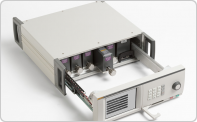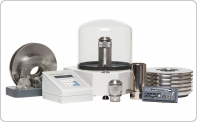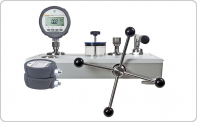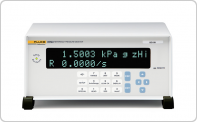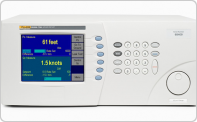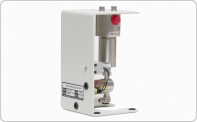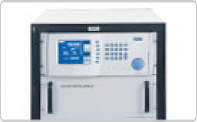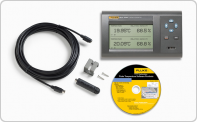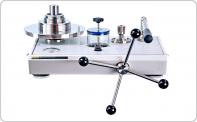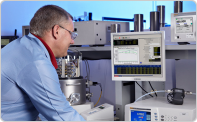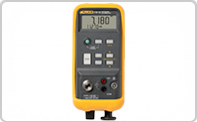- Other Fluke companies:
- Fluke
- Fluke Biomedical
- Fluke Networks
- Fluke Process Instruments

Pressure Calibration
Pressure is a sophisticated measurement discipline. But Fluke Calibration has the experts—and the best-engineered product solutions—and we can answer all your questions.
What is pressure calibration?
Pressure calibration is the comparison of the output of a device used to measure pressure with that of another pressure measurement device, or pressure measurement standard. This usually involves plumbing the device under test (DUT) to the standard device and generating a common pressure in the measurement circuit. The outputs of the devices are compared at one or more pressures, typically from the lowest to highest readings of the DUT’s full scale range, or the range for which it is normally used. This comparison process is performed in a chain from the highest level of fundamental pressure realization, down to every day pressure measurement devices, to ensure pressure measurements are accurate and comply with accepted or mandated standards.
Where is pressure calibration used?
National Metrology Institutes
A National Metrology Institute (NMI) is an institution responsible for realizing and disseminating measured values according to the International System of Units (SI). There is typically one NMI in each country, formally designated, and in some countries mandated to enforce metrology standards in industry and science. Fluke Calibration piston gauges are widely used in NMI laboratories worldwide to fundamentally determine and disseminate pressure values with low uncertainties. Fluke Calibration offers PG9000 piston gauges, specifically designed for metrology institutes to realize and disseminate pressure values with direct traceability to dimensional measurements.
Primary calibration laboratories
Primary calibration laboratories provide a link from national metrology institutes or fundamentally derived measurements to secondary laboratories and working standards. These laboratories typically perform very high precision calibrations in low volumes, and include top military, research, corporate and commercial calibration labs. A primary pressure calibration laboratory typically utilizes fundamental pressure standards, such as PG7000 or 2400 piston gauges, with traceability through a national metrology institute or another primary calibration laboratory. To disseminate primary pressure values to working standards, these labs may also use high performance transfer standards, such as PPC/RPM and 7000 pressure controller / calibrators and reference pressure monitors or Pressurements deadweight testers.
Secondary labs and instrument calibration shops
A majority of the facilities in the world that perform pressure calibrations utilize transfer or working standards to support pressure measurement devices (pressure gauges, transmitters, transducers, etc.) and other working calibration standards. These laboratories can perform a range from basic tests to high precision calibrations, and typically in higher volumes than an NMI or primary calibration laboratory. Traceability of pressure standards is maintained through a primary laboratory or another secondary calibration lab. To support working standards and high performance measurement devices, a secondary pressure lab typically utilizes high performance transfer standards, such as PPC/RPM and 7000 pressure controller / calibrators and reference pressure monitors or Pressurements deadweight testers. PG7000 or 2400 piston gauges can be used for more demanding applications. Everyday calibration of measurement devices and lower performance working standards can use the same high performance transfer standards, or working standards such as E-DWT electronic deadweight tester or PPC4E pressure controller/calibrator.
Field, onsite and mobile calibration
Often, the device to be calibrated cannot be removed from its process, or bringing the calibration standard to the device to be tested can considerably reduce downtime and save considerable resources. Fluke Calibration enables in situ calibration with transportable solutions such as Pressurements deadweight testers and pressure comparators, Fluke Calibration RPM4 reference pressure monitors and E-DWT electronic deadweight tester. We can also provide a mobile solution (calibration cart, transportable case or rack-mount system) with our custom calibration systems. For applications in which a portable handheld solution is needed, Fluke Calibration offers a line of industrial process calibration tools, including rugged pressure calibrators and modules.
Pressure sensor manufacturing and service
Manufacturers of pressure gauges, pressure transmitters, pressure transducers, pressure switches, pressure indicators, and other pressure measurement devices utilize calibration standards to ensure that their products meet specification. They may also offer traceable pressure calibration with new devices, and calibration services for post-sale support. These pressure test and calibration processes require pressure reference standards ranging from basic pressure indicators to high performance piston gauges, depending on the performance of the product being tested. Because manufacturers test and calibrate large volumes of identical or similar pressure equipment, they often utilize pressure controllers such as Fluke Calibration PPC and 7000 pressure controller / calibrators to automate the process. For test of very high precision pressure instruments, PG7000 piston gauges are automated with PG7000-AMH automated mass handlers and PPC pressure controllers.
Air data calibration
Aircraft use a variety of pressure sensors to determine fuel pressure, cabin pressure, engine performance, hydraulic line pressure, and other important operational characteristics. Calibration of these sensors must be rigorously maintained to ensure efficient aircraft operation and safety. Of critical importance is the pitot-static system which utilizes an absolute static pressure (Ps) sensor to determine altitude and rate of climb (altimeter and vertical speed indicator), and an absolute total pressure (Pt) sensor or differential impact pressure (Qc) sensor, to determine air speed (airspeed indicator). Modern avionics system air data computers use pressure value inputs from these sensors to determine calibrated airspeed (true airspeed), Mach number, altitude and altitude trend. Fluke Calibration offers RSVM compliant (reduced vertical separation minima) pressure standards for pitot-static system measurements. Fluke Calibration's 7750i air data calibrator and RPM4-AD air data pressure monitor are used to directly calibrate air data sensors and the flight line air data test sets used to test them. These transfer standards must maintain traceability to primary pressure standards, such as 2468 pitot-static piston gauge and ADCS-601 air data calibration system, which are optimized for support of air data equipment.
DH Instruments (DHI), Ruska Instruments, Pressurements and the Fluke Calibration brand
Selecting a Solution
Fluke Calibration offers a wide range of pressure calibration solutions. The following links are intended to lead you to information about the solutions available. This guide is not an exhaustive study of your application - it is intended to point you in the right direction. If at any time you would like help with a pressure calibration application or with your DHI, Ruska or Pressurements products, please don’t hesitate to call us at 877-439-7225 or email us at sales@flukecal.com for expert application support.
Product Selection Guides
What is the accuracy/uncertainty of the device to be tested?
What is the environment in which the calibration is to take place?
What are the pressure range and test medium of the device to be tested?
Are pressure generation and control required?
To what extent can the calibration process be automated?
What is else is needed to complete the pressure calibration solution?
Related reference materials
The Electronic Deadweight Tester -- A Modern Replacement for the Conventional Deadweight Tester
- Home
- Products
- New Products
- Electrical Calibration
- RF Calibration
- Data Acquisition and Test Equipment
- Temperature Calibration
- Humidity Calibration
- Pressure Calibration
- Flow Calibration
- Process Calibration Tools
- Calibration Software
- Service and Support
- All Calibration Instruments
- Handheld Test Tools
- Purchase Info
- News
- Training and Events
- Literature and Education
- Service and Support
- About Us
Sidebar Request a Quote
Request a quote


